Impact of Brexit on Business, Trade, and Travel: A Review
VerifiedAdded on 2022/08/28
|7
|1856
|23
Report
AI Summary
This report provides a comprehensive literature review on the impact of Brexit on business, trade, and travel. It begins with a definition of Brexit and its context, explaining the UK's decision to leave the European Union and the ensuing economic and political consequences. The report explores the impact of Brexit on UK businesses, including reduced investment, changes in employment, and increased costs. It examines the effects on trade flows, particularly between the UK and the EU, and analyzes the sectors most affected, such as motor vehicles and services. The report also delves into the methodological approach used, including deductive reasoning and qualitative and quantitative research methods, to assess the impacts. The analysis considers macroeconomic effects, political implications, and potential future scenarios, concluding with a discussion of the limitations of the research. The report emphasizes the uncertainty that Brexit has created for businesses, the increased trade costs, and the need for businesses to adapt to new trade relationships and regulations, with a focus on future developments and the long-term effects of Brexit on the UK economy.
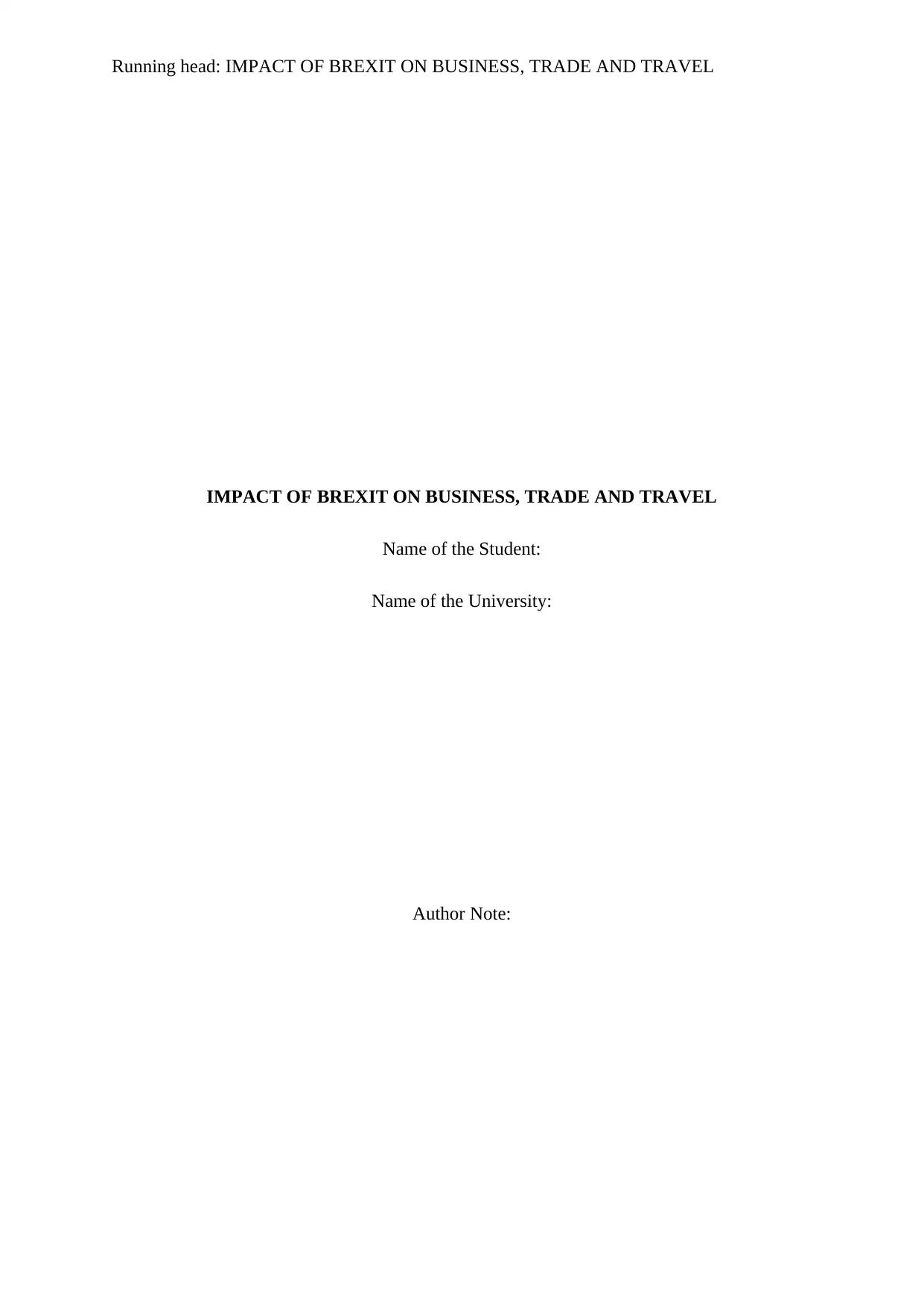
Running head: IMPACT OF BREXIT ON BUSINESS, TRADE AND TRAVEL
IMPACT OF BREXIT ON BUSINESS, TRADE AND TRAVEL
Name of the Student:
Name of the University:
Author Note:
IMPACT OF BREXIT ON BUSINESS, TRADE AND TRAVEL
Name of the Student:
Name of the University:
Author Note:
Paraphrase This Document
Need a fresh take? Get an instant paraphrase of this document with our AI Paraphraser
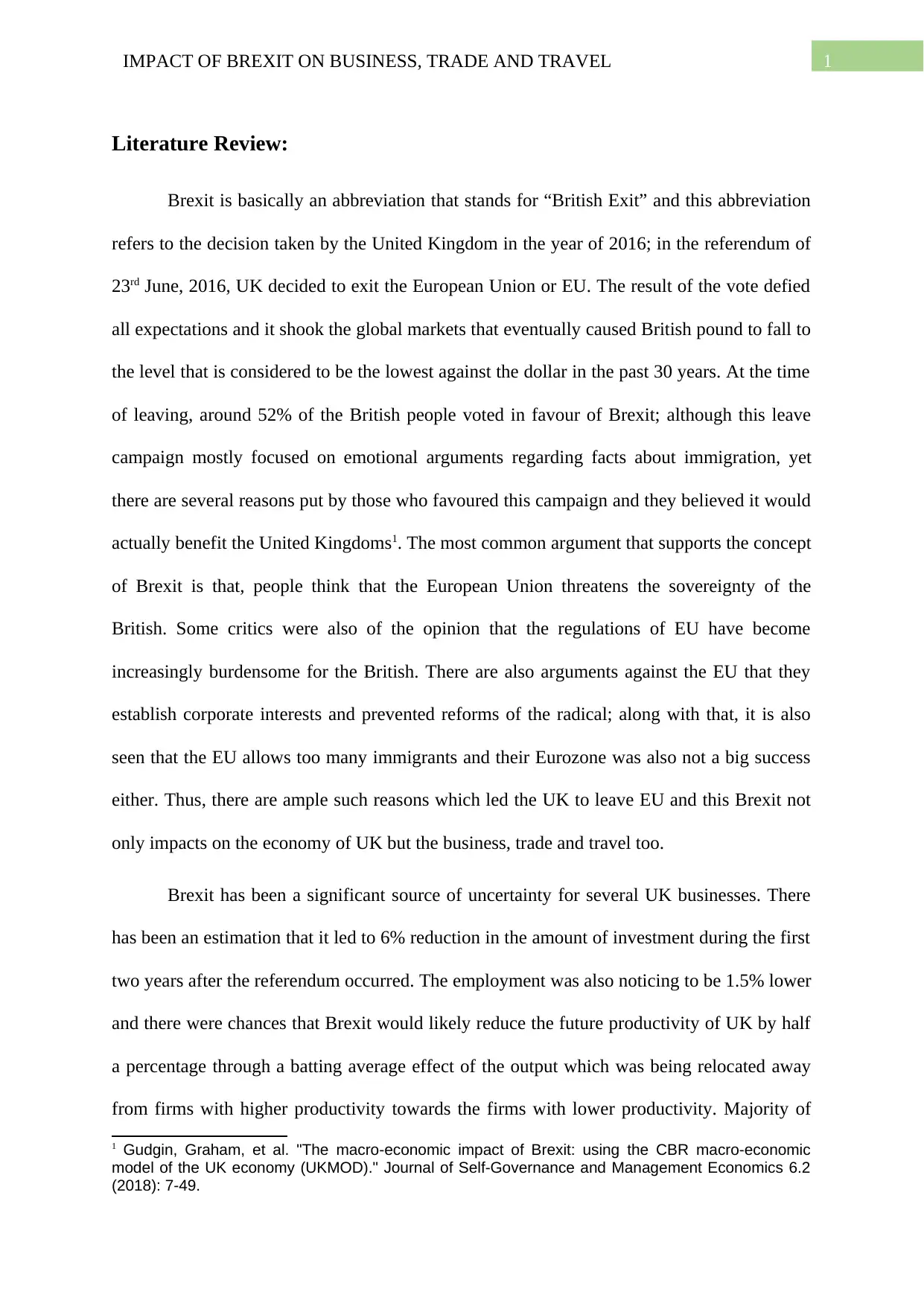
1IMPACT OF BREXIT ON BUSINESS, TRADE AND TRAVEL
Literature Review:
Brexit is basically an abbreviation that stands for “British Exit” and this abbreviation
refers to the decision taken by the United Kingdom in the year of 2016; in the referendum of
23rd June, 2016, UK decided to exit the European Union or EU. The result of the vote defied
all expectations and it shook the global markets that eventually caused British pound to fall to
the level that is considered to be the lowest against the dollar in the past 30 years. At the time
of leaving, around 52% of the British people voted in favour of Brexit; although this leave
campaign mostly focused on emotional arguments regarding facts about immigration, yet
there are several reasons put by those who favoured this campaign and they believed it would
actually benefit the United Kingdoms1. The most common argument that supports the concept
of Brexit is that, people think that the European Union threatens the sovereignty of the
British. Some critics were also of the opinion that the regulations of EU have become
increasingly burdensome for the British. There are also arguments against the EU that they
establish corporate interests and prevented reforms of the radical; along with that, it is also
seen that the EU allows too many immigrants and their Eurozone was also not a big success
either. Thus, there are ample such reasons which led the UK to leave EU and this Brexit not
only impacts on the economy of UK but the business, trade and travel too.
Brexit has been a significant source of uncertainty for several UK businesses. There
has been an estimation that it led to 6% reduction in the amount of investment during the first
two years after the referendum occurred. The employment was also noticing to be 1.5% lower
and there were chances that Brexit would likely reduce the future productivity of UK by half
a percentage through a batting average effect of the output which was being relocated away
from firms with higher productivity towards the firms with lower productivity. Majority of
1 Gudgin, Graham, et al. "The macro-economic impact of Brexit: using the CBR macro-economic
model of the UK economy (UKMOD)." Journal of Self-Governance and Management Economics 6.2
(2018): 7-49.
Literature Review:
Brexit is basically an abbreviation that stands for “British Exit” and this abbreviation
refers to the decision taken by the United Kingdom in the year of 2016; in the referendum of
23rd June, 2016, UK decided to exit the European Union or EU. The result of the vote defied
all expectations and it shook the global markets that eventually caused British pound to fall to
the level that is considered to be the lowest against the dollar in the past 30 years. At the time
of leaving, around 52% of the British people voted in favour of Brexit; although this leave
campaign mostly focused on emotional arguments regarding facts about immigration, yet
there are several reasons put by those who favoured this campaign and they believed it would
actually benefit the United Kingdoms1. The most common argument that supports the concept
of Brexit is that, people think that the European Union threatens the sovereignty of the
British. Some critics were also of the opinion that the regulations of EU have become
increasingly burdensome for the British. There are also arguments against the EU that they
establish corporate interests and prevented reforms of the radical; along with that, it is also
seen that the EU allows too many immigrants and their Eurozone was also not a big success
either. Thus, there are ample such reasons which led the UK to leave EU and this Brexit not
only impacts on the economy of UK but the business, trade and travel too.
Brexit has been a significant source of uncertainty for several UK businesses. There
has been an estimation that it led to 6% reduction in the amount of investment during the first
two years after the referendum occurred. The employment was also noticing to be 1.5% lower
and there were chances that Brexit would likely reduce the future productivity of UK by half
a percentage through a batting average effect of the output which was being relocated away
from firms with higher productivity towards the firms with lower productivity. Majority of
1 Gudgin, Graham, et al. "The macro-economic impact of Brexit: using the CBR macro-economic
model of the UK economy (UKMOD)." Journal of Self-Governance and Management Economics 6.2
(2018): 7-49.
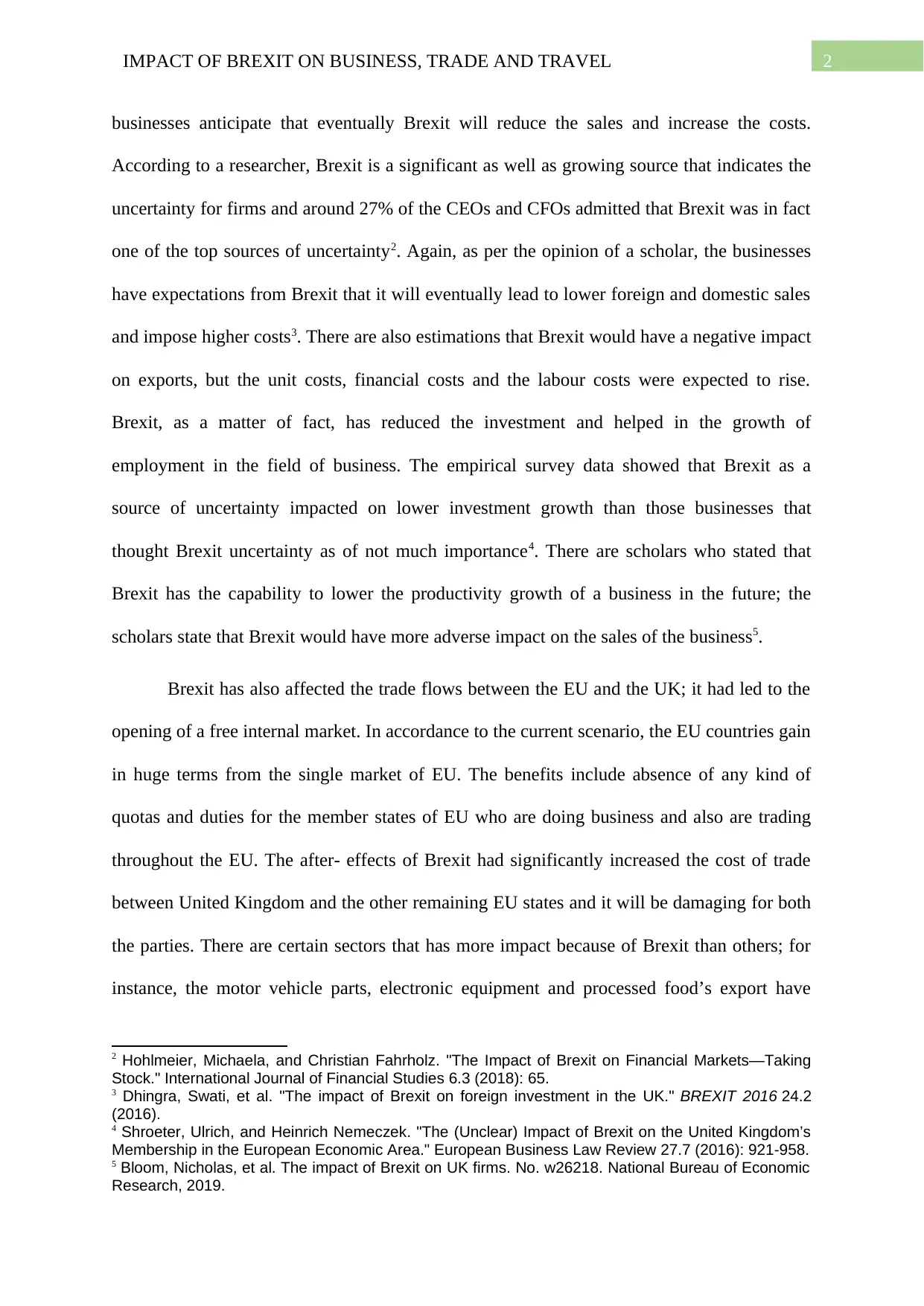
2IMPACT OF BREXIT ON BUSINESS, TRADE AND TRAVEL
businesses anticipate that eventually Brexit will reduce the sales and increase the costs.
According to a researcher, Brexit is a significant as well as growing source that indicates the
uncertainty for firms and around 27% of the CEOs and CFOs admitted that Brexit was in fact
one of the top sources of uncertainty2. Again, as per the opinion of a scholar, the businesses
have expectations from Brexit that it will eventually lead to lower foreign and domestic sales
and impose higher costs3. There are also estimations that Brexit would have a negative impact
on exports, but the unit costs, financial costs and the labour costs were expected to rise.
Brexit, as a matter of fact, has reduced the investment and helped in the growth of
employment in the field of business. The empirical survey data showed that Brexit as a
source of uncertainty impacted on lower investment growth than those businesses that
thought Brexit uncertainty as of not much importance4. There are scholars who stated that
Brexit has the capability to lower the productivity growth of a business in the future; the
scholars state that Brexit would have more adverse impact on the sales of the business5.
Brexit has also affected the trade flows between the EU and the UK; it had led to the
opening of a free internal market. In accordance to the current scenario, the EU countries gain
in huge terms from the single market of EU. The benefits include absence of any kind of
quotas and duties for the member states of EU who are doing business and also are trading
throughout the EU. The after- effects of Brexit had significantly increased the cost of trade
between United Kingdom and the other remaining EU states and it will be damaging for both
the parties. There are certain sectors that has more impact because of Brexit than others; for
instance, the motor vehicle parts, electronic equipment and processed food’s export have
2 Hohlmeier, Michaela, and Christian Fahrholz. "The Impact of Brexit on Financial Markets—Taking
Stock." International Journal of Financial Studies 6.3 (2018): 65.
3 Dhingra, Swati, et al. "The impact of Brexit on foreign investment in the UK." BREXIT 2016 24.2
(2016).
4 Shroeter, Ulrich, and Heinrich Nemeczek. "The (Unclear) Impact of Brexit on the United Kingdom’s
Membership in the European Economic Area." European Business Law Review 27.7 (2016): 921-958.
5 Bloom, Nicholas, et al. The impact of Brexit on UK firms. No. w26218. National Bureau of Economic
Research, 2019.
businesses anticipate that eventually Brexit will reduce the sales and increase the costs.
According to a researcher, Brexit is a significant as well as growing source that indicates the
uncertainty for firms and around 27% of the CEOs and CFOs admitted that Brexit was in fact
one of the top sources of uncertainty2. Again, as per the opinion of a scholar, the businesses
have expectations from Brexit that it will eventually lead to lower foreign and domestic sales
and impose higher costs3. There are also estimations that Brexit would have a negative impact
on exports, but the unit costs, financial costs and the labour costs were expected to rise.
Brexit, as a matter of fact, has reduced the investment and helped in the growth of
employment in the field of business. The empirical survey data showed that Brexit as a
source of uncertainty impacted on lower investment growth than those businesses that
thought Brexit uncertainty as of not much importance4. There are scholars who stated that
Brexit has the capability to lower the productivity growth of a business in the future; the
scholars state that Brexit would have more adverse impact on the sales of the business5.
Brexit has also affected the trade flows between the EU and the UK; it had led to the
opening of a free internal market. In accordance to the current scenario, the EU countries gain
in huge terms from the single market of EU. The benefits include absence of any kind of
quotas and duties for the member states of EU who are doing business and also are trading
throughout the EU. The after- effects of Brexit had significantly increased the cost of trade
between United Kingdom and the other remaining EU states and it will be damaging for both
the parties. There are certain sectors that has more impact because of Brexit than others; for
instance, the motor vehicle parts, electronic equipment and processed food’s export have
2 Hohlmeier, Michaela, and Christian Fahrholz. "The Impact of Brexit on Financial Markets—Taking
Stock." International Journal of Financial Studies 6.3 (2018): 65.
3 Dhingra, Swati, et al. "The impact of Brexit on foreign investment in the UK." BREXIT 2016 24.2
(2016).
4 Shroeter, Ulrich, and Heinrich Nemeczek. "The (Unclear) Impact of Brexit on the United Kingdom’s
Membership in the European Economic Area." European Business Law Review 27.7 (2016): 921-958.
5 Bloom, Nicholas, et al. The impact of Brexit on UK firms. No. w26218. National Bureau of Economic
Research, 2019.
⊘ This is a preview!⊘
Do you want full access?
Subscribe today to unlock all pages.

Trusted by 1+ million students worldwide
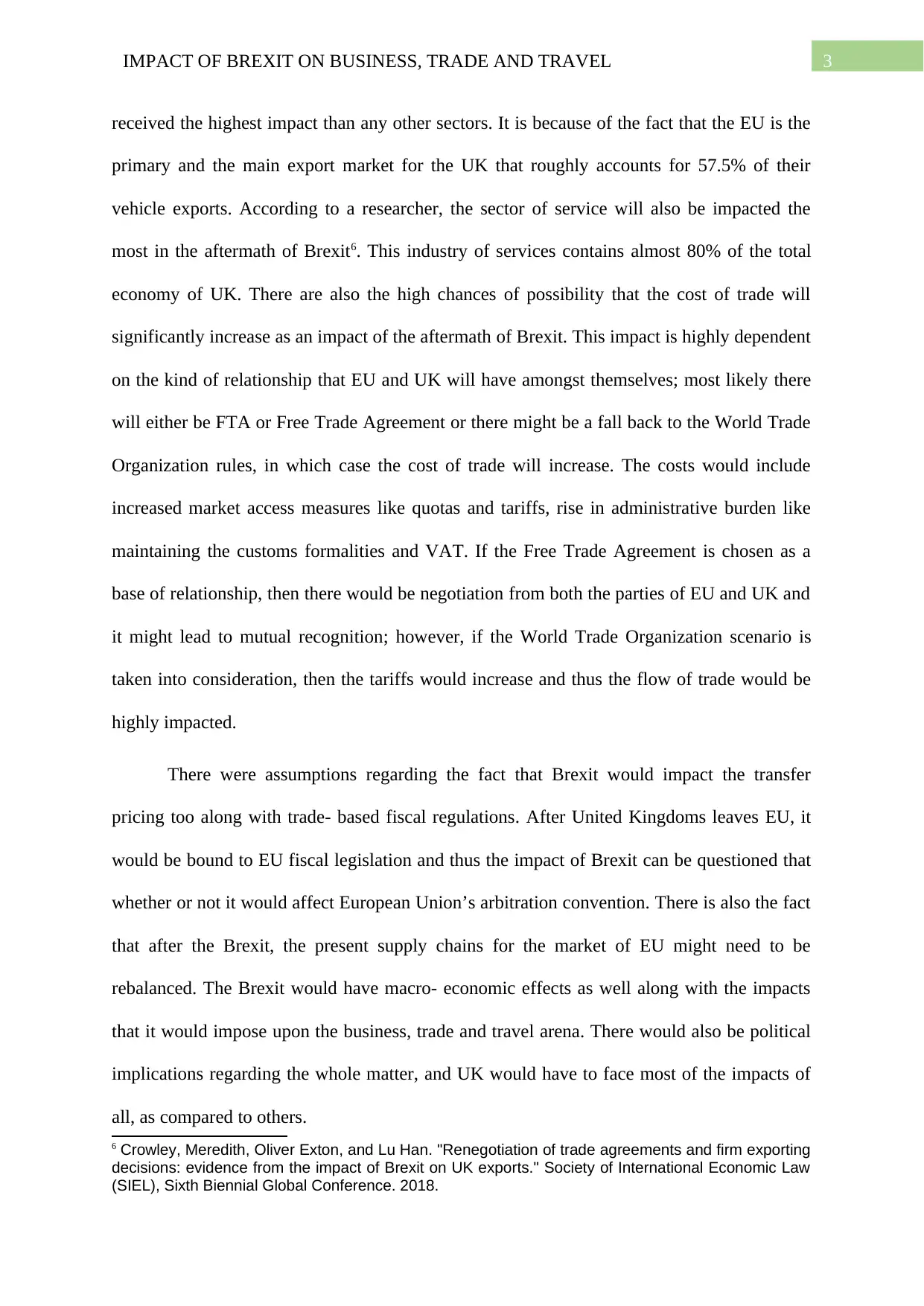
3IMPACT OF BREXIT ON BUSINESS, TRADE AND TRAVEL
received the highest impact than any other sectors. It is because of the fact that the EU is the
primary and the main export market for the UK that roughly accounts for 57.5% of their
vehicle exports. According to a researcher, the sector of service will also be impacted the
most in the aftermath of Brexit6. This industry of services contains almost 80% of the total
economy of UK. There are also the high chances of possibility that the cost of trade will
significantly increase as an impact of the aftermath of Brexit. This impact is highly dependent
on the kind of relationship that EU and UK will have amongst themselves; most likely there
will either be FTA or Free Trade Agreement or there might be a fall back to the World Trade
Organization rules, in which case the cost of trade will increase. The costs would include
increased market access measures like quotas and tariffs, rise in administrative burden like
maintaining the customs formalities and VAT. If the Free Trade Agreement is chosen as a
base of relationship, then there would be negotiation from both the parties of EU and UK and
it might lead to mutual recognition; however, if the World Trade Organization scenario is
taken into consideration, then the tariffs would increase and thus the flow of trade would be
highly impacted.
There were assumptions regarding the fact that Brexit would impact the transfer
pricing too along with trade- based fiscal regulations. After United Kingdoms leaves EU, it
would be bound to EU fiscal legislation and thus the impact of Brexit can be questioned that
whether or not it would affect European Union’s arbitration convention. There is also the fact
that after the Brexit, the present supply chains for the market of EU might need to be
rebalanced. The Brexit would have macro- economic effects as well along with the impacts
that it would impose upon the business, trade and travel arena. There would also be political
implications regarding the whole matter, and UK would have to face most of the impacts of
all, as compared to others.
6 Crowley, Meredith, Oliver Exton, and Lu Han. "Renegotiation of trade agreements and firm exporting
decisions: evidence from the impact of Brexit on UK exports." Society of International Economic Law
(SIEL), Sixth Biennial Global Conference. 2018.
received the highest impact than any other sectors. It is because of the fact that the EU is the
primary and the main export market for the UK that roughly accounts for 57.5% of their
vehicle exports. According to a researcher, the sector of service will also be impacted the
most in the aftermath of Brexit6. This industry of services contains almost 80% of the total
economy of UK. There are also the high chances of possibility that the cost of trade will
significantly increase as an impact of the aftermath of Brexit. This impact is highly dependent
on the kind of relationship that EU and UK will have amongst themselves; most likely there
will either be FTA or Free Trade Agreement or there might be a fall back to the World Trade
Organization rules, in which case the cost of trade will increase. The costs would include
increased market access measures like quotas and tariffs, rise in administrative burden like
maintaining the customs formalities and VAT. If the Free Trade Agreement is chosen as a
base of relationship, then there would be negotiation from both the parties of EU and UK and
it might lead to mutual recognition; however, if the World Trade Organization scenario is
taken into consideration, then the tariffs would increase and thus the flow of trade would be
highly impacted.
There were assumptions regarding the fact that Brexit would impact the transfer
pricing too along with trade- based fiscal regulations. After United Kingdoms leaves EU, it
would be bound to EU fiscal legislation and thus the impact of Brexit can be questioned that
whether or not it would affect European Union’s arbitration convention. There is also the fact
that after the Brexit, the present supply chains for the market of EU might need to be
rebalanced. The Brexit would have macro- economic effects as well along with the impacts
that it would impose upon the business, trade and travel arena. There would also be political
implications regarding the whole matter, and UK would have to face most of the impacts of
all, as compared to others.
6 Crowley, Meredith, Oliver Exton, and Lu Han. "Renegotiation of trade agreements and firm exporting
decisions: evidence from the impact of Brexit on UK exports." Society of International Economic Law
(SIEL), Sixth Biennial Global Conference. 2018.
Paraphrase This Document
Need a fresh take? Get an instant paraphrase of this document with our AI Paraphraser
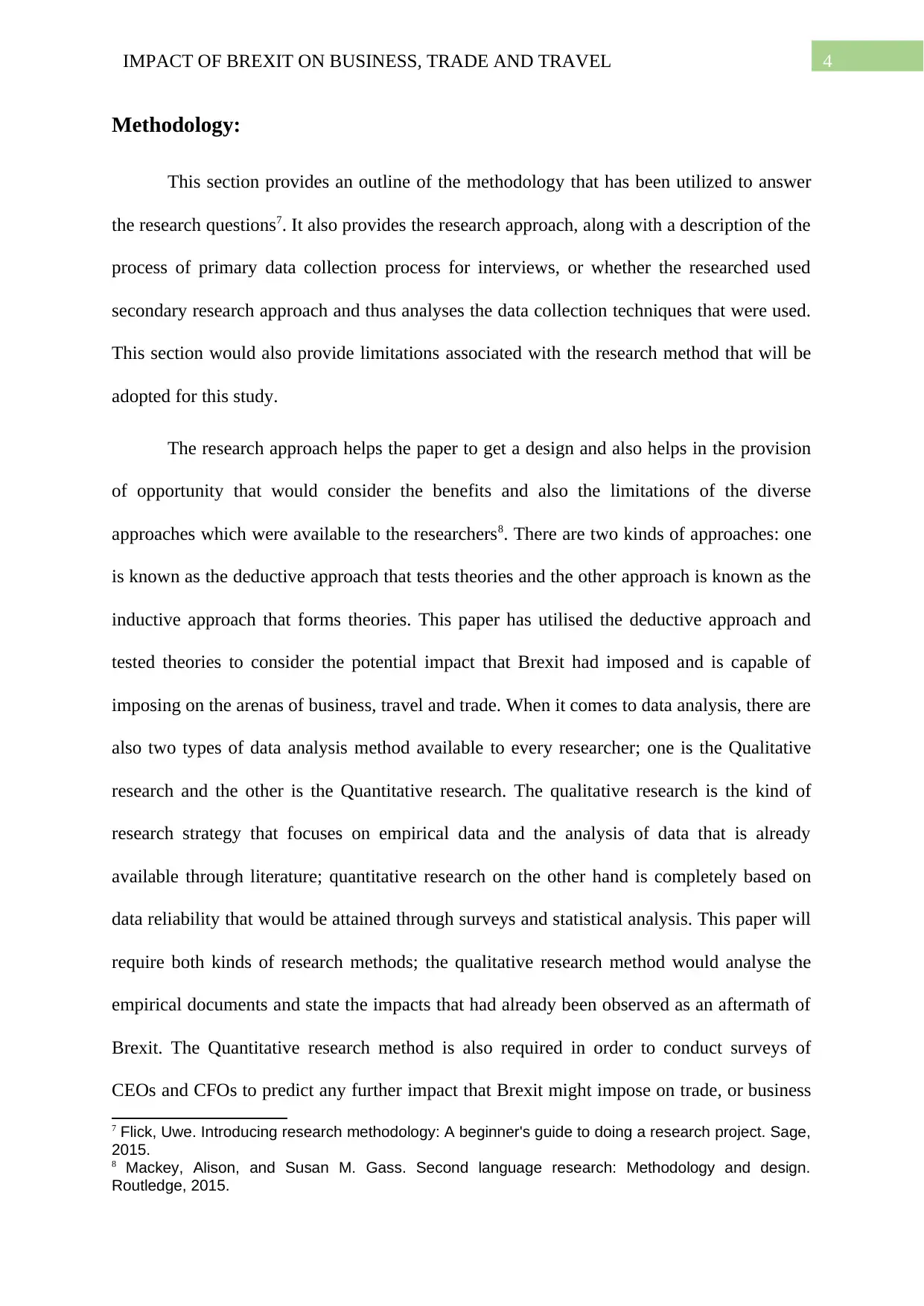
4IMPACT OF BREXIT ON BUSINESS, TRADE AND TRAVEL
Methodology:
This section provides an outline of the methodology that has been utilized to answer
the research questions7. It also provides the research approach, along with a description of the
process of primary data collection process for interviews, or whether the researched used
secondary research approach and thus analyses the data collection techniques that were used.
This section would also provide limitations associated with the research method that will be
adopted for this study.
The research approach helps the paper to get a design and also helps in the provision
of opportunity that would consider the benefits and also the limitations of the diverse
approaches which were available to the researchers8. There are two kinds of approaches: one
is known as the deductive approach that tests theories and the other approach is known as the
inductive approach that forms theories. This paper has utilised the deductive approach and
tested theories to consider the potential impact that Brexit had imposed and is capable of
imposing on the arenas of business, travel and trade. When it comes to data analysis, there are
also two types of data analysis method available to every researcher; one is the Qualitative
research and the other is the Quantitative research. The qualitative research is the kind of
research strategy that focuses on empirical data and the analysis of data that is already
available through literature; quantitative research on the other hand is completely based on
data reliability that would be attained through surveys and statistical analysis. This paper will
require both kinds of research methods; the qualitative research method would analyse the
empirical documents and state the impacts that had already been observed as an aftermath of
Brexit. The Quantitative research method is also required in order to conduct surveys of
CEOs and CFOs to predict any further impact that Brexit might impose on trade, or business
7 Flick, Uwe. Introducing research methodology: A beginner's guide to doing a research project. Sage,
2015.
8 Mackey, Alison, and Susan M. Gass. Second language research: Methodology and design.
Routledge, 2015.
Methodology:
This section provides an outline of the methodology that has been utilized to answer
the research questions7. It also provides the research approach, along with a description of the
process of primary data collection process for interviews, or whether the researched used
secondary research approach and thus analyses the data collection techniques that were used.
This section would also provide limitations associated with the research method that will be
adopted for this study.
The research approach helps the paper to get a design and also helps in the provision
of opportunity that would consider the benefits and also the limitations of the diverse
approaches which were available to the researchers8. There are two kinds of approaches: one
is known as the deductive approach that tests theories and the other approach is known as the
inductive approach that forms theories. This paper has utilised the deductive approach and
tested theories to consider the potential impact that Brexit had imposed and is capable of
imposing on the arenas of business, travel and trade. When it comes to data analysis, there are
also two types of data analysis method available to every researcher; one is the Qualitative
research and the other is the Quantitative research. The qualitative research is the kind of
research strategy that focuses on empirical data and the analysis of data that is already
available through literature; quantitative research on the other hand is completely based on
data reliability that would be attained through surveys and statistical analysis. This paper will
require both kinds of research methods; the qualitative research method would analyse the
empirical documents and state the impacts that had already been observed as an aftermath of
Brexit. The Quantitative research method is also required in order to conduct surveys of
CEOs and CFOs to predict any further impact that Brexit might impose on trade, or business
7 Flick, Uwe. Introducing research methodology: A beginner's guide to doing a research project. Sage,
2015.
8 Mackey, Alison, and Susan M. Gass. Second language research: Methodology and design.
Routledge, 2015.
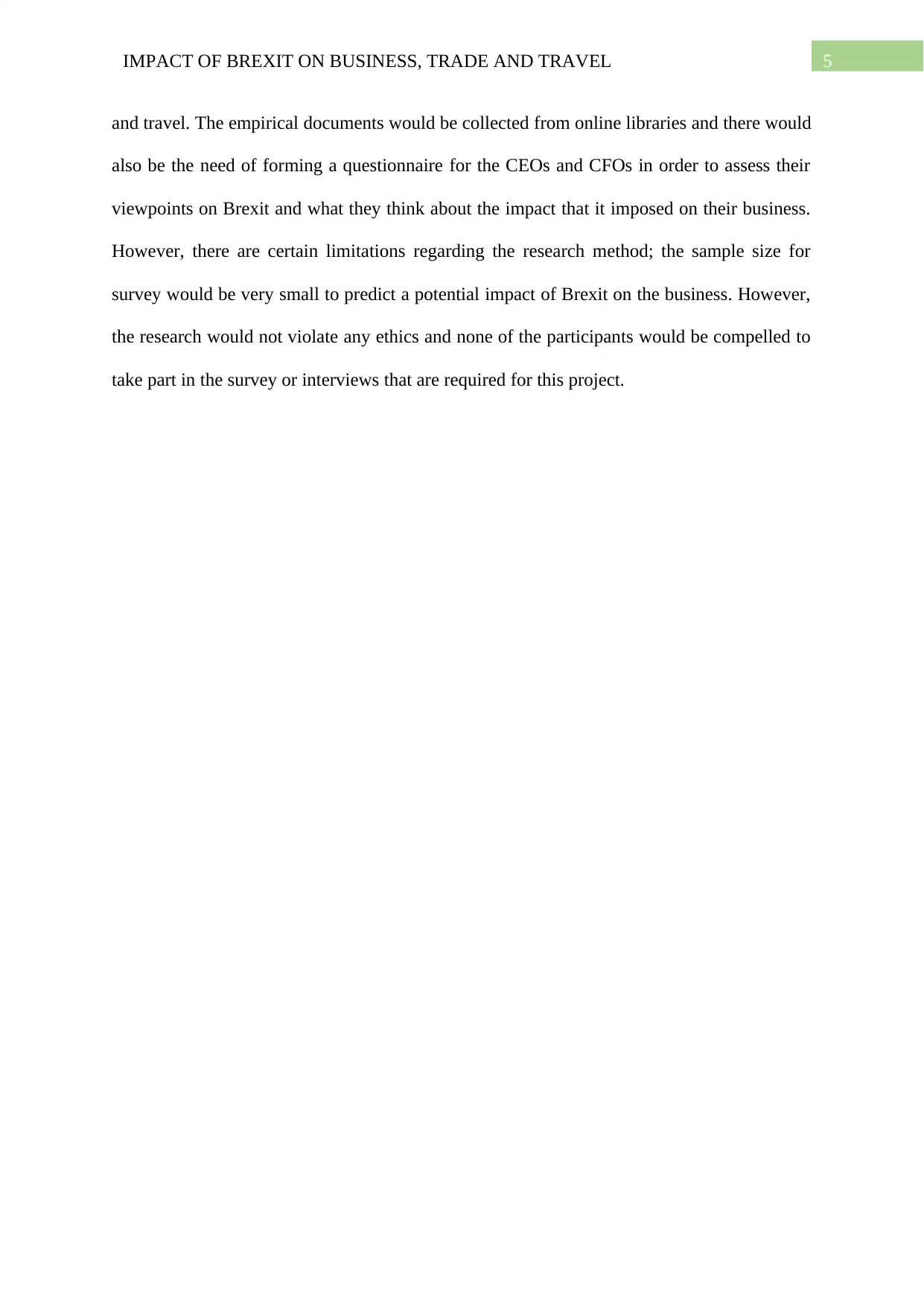
5IMPACT OF BREXIT ON BUSINESS, TRADE AND TRAVEL
and travel. The empirical documents would be collected from online libraries and there would
also be the need of forming a questionnaire for the CEOs and CFOs in order to assess their
viewpoints on Brexit and what they think about the impact that it imposed on their business.
However, there are certain limitations regarding the research method; the sample size for
survey would be very small to predict a potential impact of Brexit on the business. However,
the research would not violate any ethics and none of the participants would be compelled to
take part in the survey or interviews that are required for this project.
and travel. The empirical documents would be collected from online libraries and there would
also be the need of forming a questionnaire for the CEOs and CFOs in order to assess their
viewpoints on Brexit and what they think about the impact that it imposed on their business.
However, there are certain limitations regarding the research method; the sample size for
survey would be very small to predict a potential impact of Brexit on the business. However,
the research would not violate any ethics and none of the participants would be compelled to
take part in the survey or interviews that are required for this project.
⊘ This is a preview!⊘
Do you want full access?
Subscribe today to unlock all pages.

Trusted by 1+ million students worldwide
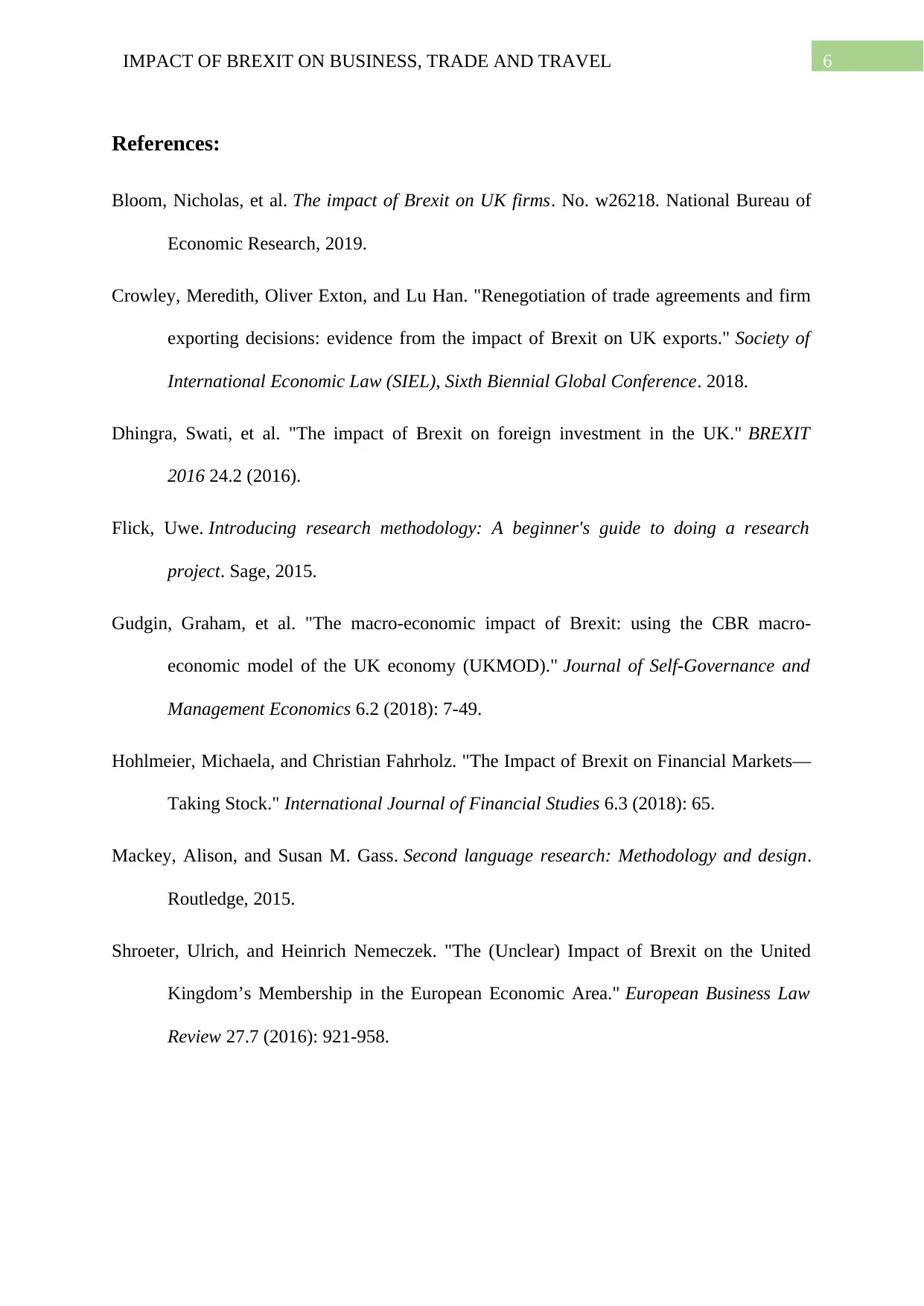
6IMPACT OF BREXIT ON BUSINESS, TRADE AND TRAVEL
References:
Bloom, Nicholas, et al. The impact of Brexit on UK firms. No. w26218. National Bureau of
Economic Research, 2019.
Crowley, Meredith, Oliver Exton, and Lu Han. "Renegotiation of trade agreements and firm
exporting decisions: evidence from the impact of Brexit on UK exports." Society of
International Economic Law (SIEL), Sixth Biennial Global Conference. 2018.
Dhingra, Swati, et al. "The impact of Brexit on foreign investment in the UK." BREXIT
2016 24.2 (2016).
Flick, Uwe. Introducing research methodology: A beginner's guide to doing a research
project. Sage, 2015.
Gudgin, Graham, et al. "The macro-economic impact of Brexit: using the CBR macro-
economic model of the UK economy (UKMOD)." Journal of Self-Governance and
Management Economics 6.2 (2018): 7-49.
Hohlmeier, Michaela, and Christian Fahrholz. "The Impact of Brexit on Financial Markets—
Taking Stock." International Journal of Financial Studies 6.3 (2018): 65.
Mackey, Alison, and Susan M. Gass. Second language research: Methodology and design.
Routledge, 2015.
Shroeter, Ulrich, and Heinrich Nemeczek. "The (Unclear) Impact of Brexit on the United
Kingdom’s Membership in the European Economic Area." European Business Law
Review 27.7 (2016): 921-958.
References:
Bloom, Nicholas, et al. The impact of Brexit on UK firms. No. w26218. National Bureau of
Economic Research, 2019.
Crowley, Meredith, Oliver Exton, and Lu Han. "Renegotiation of trade agreements and firm
exporting decisions: evidence from the impact of Brexit on UK exports." Society of
International Economic Law (SIEL), Sixth Biennial Global Conference. 2018.
Dhingra, Swati, et al. "The impact of Brexit on foreign investment in the UK." BREXIT
2016 24.2 (2016).
Flick, Uwe. Introducing research methodology: A beginner's guide to doing a research
project. Sage, 2015.
Gudgin, Graham, et al. "The macro-economic impact of Brexit: using the CBR macro-
economic model of the UK economy (UKMOD)." Journal of Self-Governance and
Management Economics 6.2 (2018): 7-49.
Hohlmeier, Michaela, and Christian Fahrholz. "The Impact of Brexit on Financial Markets—
Taking Stock." International Journal of Financial Studies 6.3 (2018): 65.
Mackey, Alison, and Susan M. Gass. Second language research: Methodology and design.
Routledge, 2015.
Shroeter, Ulrich, and Heinrich Nemeczek. "The (Unclear) Impact of Brexit on the United
Kingdom’s Membership in the European Economic Area." European Business Law
Review 27.7 (2016): 921-958.
1 out of 7
Related Documents
Your All-in-One AI-Powered Toolkit for Academic Success.
+13062052269
info@desklib.com
Available 24*7 on WhatsApp / Email
![[object Object]](/_next/static/media/star-bottom.7253800d.svg)
Unlock your academic potential
Copyright © 2020–2026 A2Z Services. All Rights Reserved. Developed and managed by ZUCOL.




